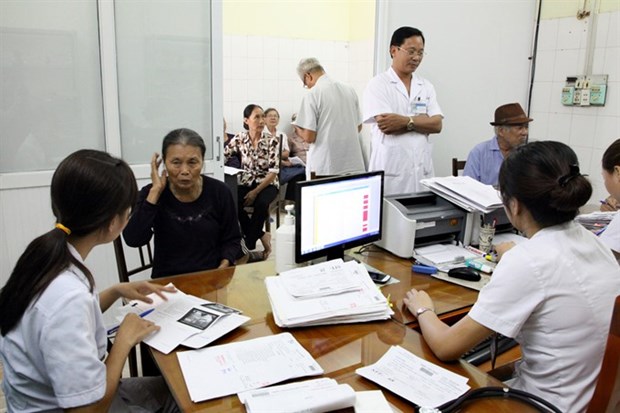Medical fees to rise for people without insurance
From June, 1,900 medical services will have new price ceilings, which means the rate for many services will rise two- or three-fold, as per a recent health ministry circular.
 Medical examinations for health insurance cardholders at Hoai Duc district General Hospital in Hanoi (Photo: VNA)
Medical examinations for health insurance cardholders at Hoai Duc district General Hospital in Hanoi (Photo: VNA)Hanoi (VNA) - From June, 1,900 medical services will have new price ceilings, which means the rate for many services will rise two- or three-fold, as per a recent health ministry circular.
Under this, patients with terminal illness or those in need advanced hi-tech treatment will have to pay a very steep fee if they don’t have health insurance. As it is, many people without insurance are already forced to offer their homes and properties as collateral for loans taken to pay for treatment and other hospital costs, as they have to pay the entire cost without any cuts.
This circular is the latest attempt by the Government to encourage people to join the State-sponsored health insurance programme as the country aims for universal health care coverage.
Hospital fees incurred by patients without insurance will be raised to account for the hospital staff’s shift remuneration and salary, as well as for surgery fees and other medical procedures.
Specifically, the medical examination fee – after all the above-mentioned additional fees are included – will go up from the current 20,000 VND (0.88 USD) a consultation to 39,000 VND (1.7 USD) in special-class and Class 1 hospitals (under the management of the Ministry of Health or provincial/municipal people’s committees).
In Class 2 hospitals (under the management of provincial/municipal departments of health), it will rise from 15,000 VND (0.66 USD) to 35,000 VND (1.5 USD); while in Class 3 hospitals (under the management of provincial/municipal departments of health, serving residents of a district or a certain number of districts), it will rise from 10,000 VND (0.44 USD) to 31,000 VND (1.4 USD). The price of some medical procedures and surgeries will also increase by 20-30 percent compared to current rate.
However, the costs for services such as cosmetic services, denture replacements, hearing aids, myopia and other refractive eye problems for insurance cardholders will be the same as those who don’t have insurance, the circular states.
The circular’s provisions will apply to public medical centres, people who have not enrolled into health insurance programme, health insurance cardholders who seek treatments or medical services not covered by Social Insurance fund.
According to the health ministry, Vietnam currently has 75 million health insurance cardholders, or 81.3 percent of the population, which means nearly 20 percent of the country is uninsured, most of whom have above average living standards.-VNA













